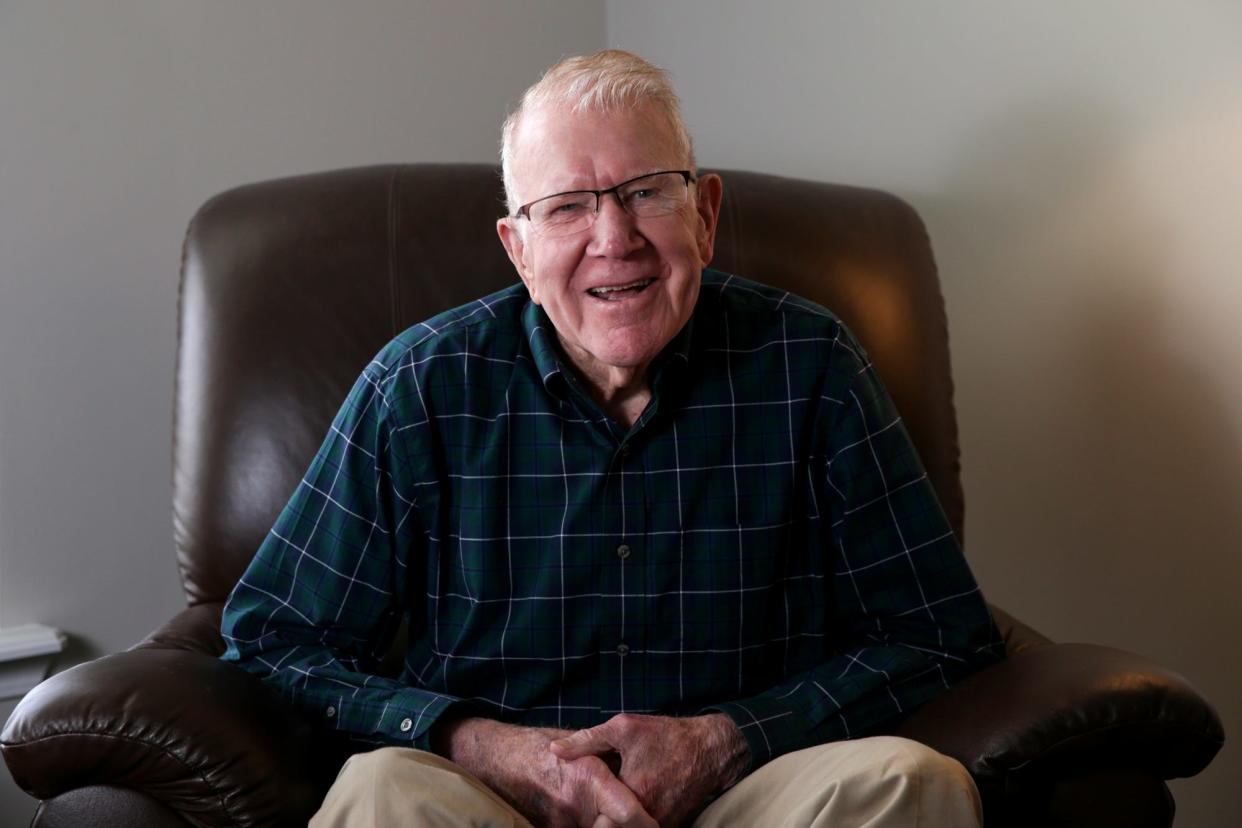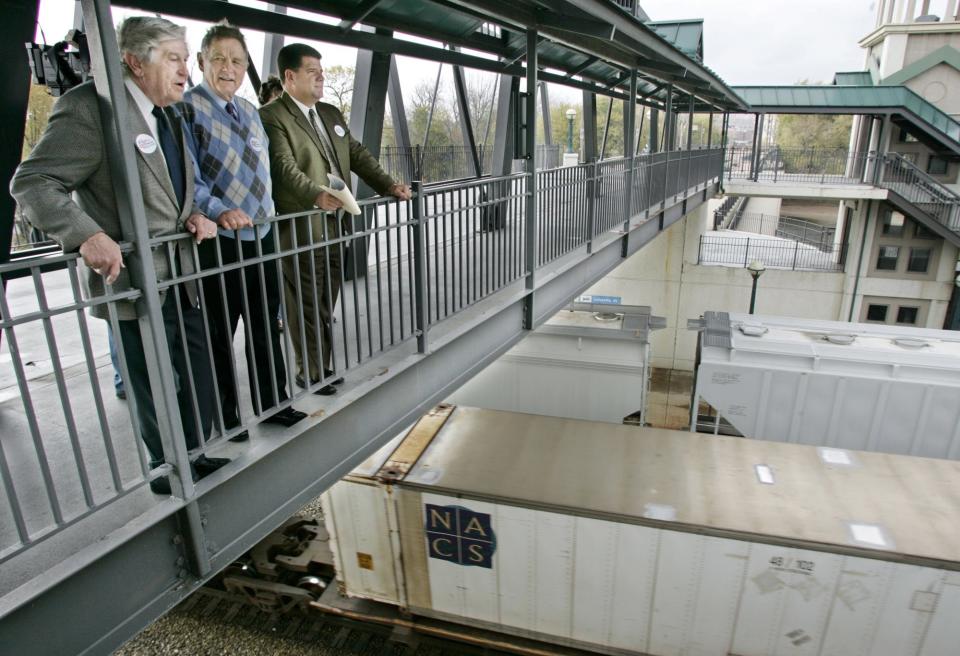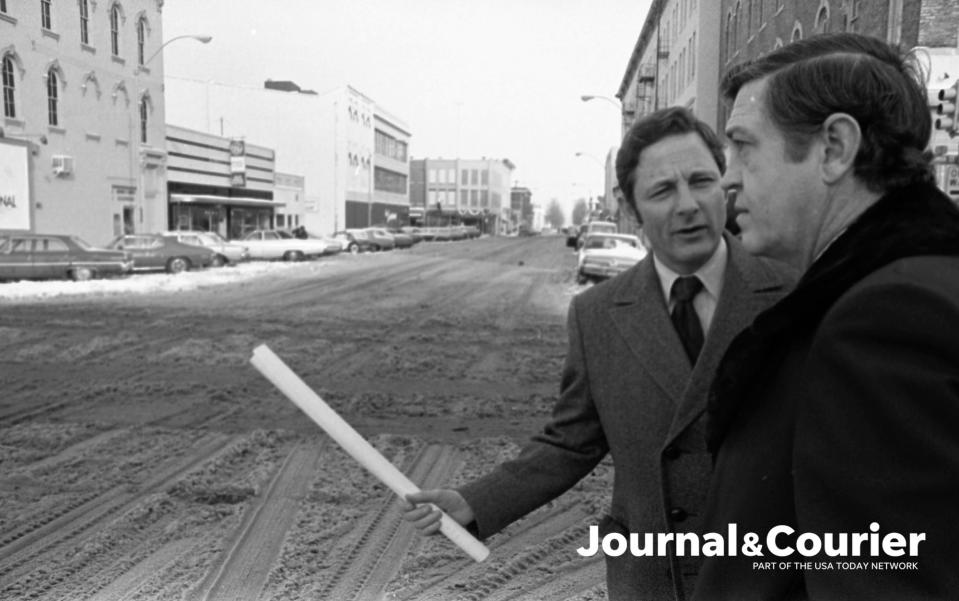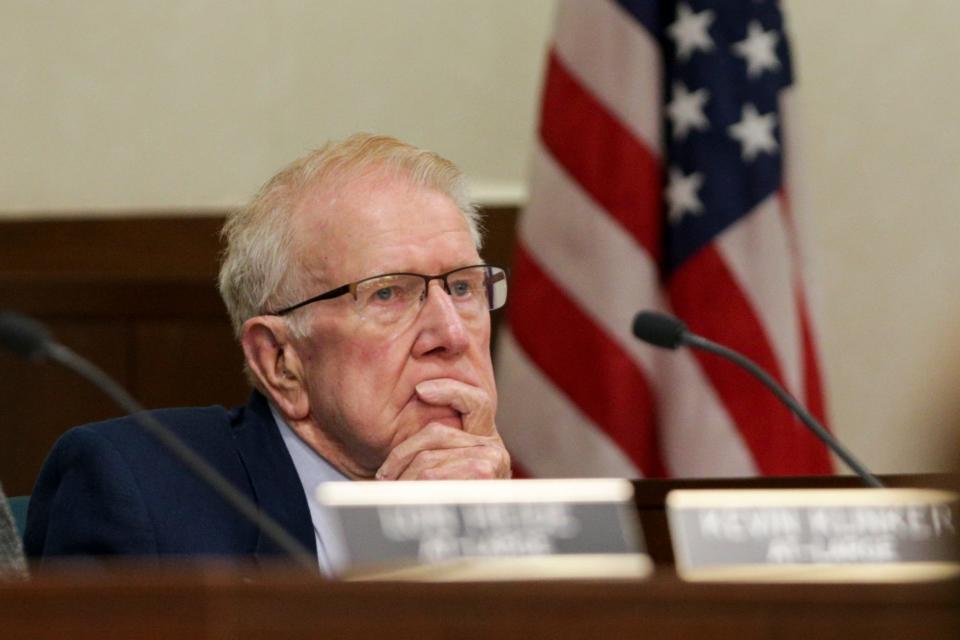'I will miss this:' Ron Campbell says goodbye after 50 years on Lafayette City Council

LAFAYETTE, Ind. — Lafayette looks quite different than when Ron Campbell first began serving on the City Council.
A half-century ago.
Before major corporations moved into Lafayette and before downtown became a bustling commercial hub, Campbell recalled a city known for its connection to Purdue and for the train that would be everyone’s excuse for showing up late to work that day.
Although many public officials have banded together over the years to make the city what it is today, only one man can say he was there to witness 50 years of change – Lafayette’s outgoing city councilman.
More: Greater Lafayette region awarded $30M in redevelopment funding
Over the past 50 years, Campbell has served on Lafayette’s City Council as its District 2 representative. At the last meeting of 2021, Campbell broke the news to his friends and colleagues that he’d be retiring due to health concerns.
“I’m going to miss this. I’m going to miss the people and the job because it was fun… But I think it was time. I’m having trouble with my memory and it’s not fair for the citizens, and it’s time to bring in somebody else who will do a better job. But I will miss it,” said Campbell, who is 90 years old.
At that same meeting, Lafayette Mayor Tony Roswarski asked those in attendance to put that half-century into perspective.
"If you think back 50 years to the multitude of projects and parks and roads and railroads relocation and Subaru and Caterpillar and GE, and the list goes on and on. You have helped play a role in bringing to this community and making this community the fine place it is, to live, to work and to raise our families,” said Roswarski.
If you were to ask Campbell which decision he remembers most over his storied career, he'd say it would have to be the first major ordinance that he worked on, the relocation of the railroad, and his most controversial ordinance, the non-smoking ordinance.
Before he became a councilman
Before Campbell was ever affiliated with the City Council, he worked as the assistant principal at the newly built Jefferson High School. For over a decade he had worked at a variety of schools throughout the district, and once he became the assistant principal, he figured he was set in stone.
That was until Jim Riehle, a friend of Campbell and future mayor of Lafayette, came knocking at his door.
That year, 1970, Riehle was running for city mayor and had asked Campbell if he’d be willing to run for City Council.
Campbell had no ambition for politics, he believed his talents were best suited to helping the kids of the community. After discussing the idea with his wife, Marlene Campbell convinced him to run.
Campbell fondly recalled Marlene’s enthusiasm for the campaign and gloated about the fact that she carried him to victory. She was the mastermind behind Campbell’s winning strategy – a can of soup.
It wasn’t any ordinary can of soup, it was a customized can of Campbell's soup. Instead of the bronze medallion in the middle, it was a photo of Ron’s face. They also replaced the ingredients of soup with the ingredients that would make Ron a good councilman, like honesty, integrity and other positive traits.
“If you saw him during his campaign, he looked like Santa Claus. He had a garbage bag thrown over his shoulder like Santa’s gift bag, but instead of presents it was full of these cans of soups that he’d hand out to people,” said Jeanne Miller, one of Campbell’s daughters.
Over the next few months, Riehle and Campbell campaigned across the city, going door to door and, on the night of the election, were declared the city’s newest officials.

Riehle Plaza, located on the edge of Wabash River in downtown Lafayette, is named after Campbell's campaign partner. Riehle was the first mayor in Lafayette’s history to win three consecutive elections; he would eventually win three more elections and served as mayor for a total of 24 years until he lost to Dave Heath by 164 votes in 1995.
Railroad relocation
The first item that both Riehle and Campbell wanted to address was the relocation of the railroad that sliced through the middle of the city. The train had a tendency to slow down the city to a crawl, but it also held major significance to the townspeople.
“Lafayette was a really interesting place before the railroad relocation because the train came right down the middle of the street. One of the scenes that I remember a great deal was when we beat Norte Dame and it stopped the whole city because the train sat there in the middle of 5th Street. It just stayed there for a while, while everybody celebrated around it,” said Campbell.
When the idea was first introduced, there was a lot of push back from the government, believing that the relocation of the railroad wouldn’t fix the dying businesses in downtown Lafayette. After months of consideration, the American Institute of Architect’s Regional Urban Design Assistance Team reluctantly endorsed the relocation.
“The American Institute of Architect’s Regional Urban Design Assistance Team has endorsed riverfront railroad relocation and revitalization of downtown Lafayette…
In the report that gave no startling insights or recommendations, the team defined the downtown as a neighborhood, rather than the central business core found in most cities, said parking is not a problem downtown and said railroad relocation is not the answer to the community’s problems but one of a series of things to be done to improve the community.
Most members of the team said railroad relocation would not solve downtown woes.
“Hundreds of cities across the country have exactly the same downtown problems as Lafayette,” said (William) Haralson.
“Railroad relocation by itself will not solve the problem entirely,” " read an issue of the Journal and Courier from Sept. 10, 1974, which covered RUDAT’s decision.
Once Campbell, Riehle and the rest of the city council heard about the news, they all jumped into action .Over the next decade, they completed the plans for the railroad relocation and secured over $4.3 million in funds for the project.

The project itself didn’t begin production until May of 1986, and it wouldn’t be completed until 2001. The project removed 42 at-grade rail crossings from Lafayette.
This was the first step of Campbell's career to help transform Lafayette from the rural city to the mid-west metropolis he cherishes today.
Non-smoking ordinance
Throughout Councilman Campbell's career, there were many ordinances that he brought forth that passed without a murmur from the community. One in particular caused a major controversy amongst the people – his non-smoking ordinance.
In the early 2000s, there were a series of anti-smoking commercials that tried to showcase the harmful effects of smoking, especially the harm of second-hand smoke on children.
One person deeply moved by these ads was Campbell.
“They’re blunt, powerful and sometimes disturbing, but there was one in particular that sent a chill down Ron Campbell’s spine.
“The one with the young child strapped into her car seat…the doors are locked, and then Mom lights up a cigarette,” said Campbell, Lafayette City Council president. “That little child can’t get out of it. That one really moved me.”
Urged in part by that 30-second television spot, Campbell wants a citywide smoking ban in the workplace, restaurants and bars. The council has about two months to consider the ordnance before voting he said,” read an issue of the Journal and Courier from Jul. 14, 2004.
With hindsight, this idea seems like a no-brainer, but at the time, it was one of the most controversial ideas that Campbell had championed as a councilman.
Within that same article, it highlighted the outrage felt by citizens and businesses alike. One councilman even publicly expressed his disagreement with the idea and pledged to vote against the ordinance once Campbell presented it.
This sentiment for the ordinance haunted Campbell for the next four years of his career. Every time the issue was brought to the table, it drew in a large crowd of protesters exclaiming that this ordinance was infringing on their rights and that it would be the harbinger of destruction for business in downtown Lafayette.

And although these meetings brought out the vitriol of the community, Campbell always sat in his seat on the council and listened to the people. While the outrage never changed his mind –he held his ground with a steadfast vigor – he was willing to compromise where he saw fit.
At a meeting in April of 2008, councilman Steve Meyer proposed two amendments to the ordinance that would allow smoking in certain businesses in Lafayette. Those allowed smoking in private areas in family-owned businesses that only employ family members; and in businesses serving and employing people 21 and older.
Although Campbell was initially against both amendments, he eventually compromised on the amendment regarding businesses serving and employing people 21 and older. After four years of hard work, the ordinance was passed in May of 2008.
When asked how he felt about that period of his life, Campbell went quiet for a moment.
He sat back in his chair and began to stare at the ceiling. He was clearly pondering on the question, or perhaps he was recollecting on those events.
He eventually answered.
“It was very difficult, to say the least, because there were still a lot of feelings of, “Hey, you’re taking this away from me and this is my right to go and have a smoke,” but it’s worked out. Knock on wood. It’s too bad we can’t get the one place that is still doing it, but it’s something you live with,” said Campbell.
“I think it was the right thing to do from the standpoint of people’s health in general because if you choose not to sit next to somebody who’s smoking you don’t have to worry about that now. You can go someplace where it’s not allowed. We had it in every restaurant available and now that is gone, and I think the people appreciated it.”
“I think the people have grown used to it and they’ve (businesses) accepted it now. And it didn’t affect them, well maybe immediately it did, but over the long haul there’s been no effect.”
Parting words

Campbell relaxed in his chair and reflected on the half-century that was spent at the helm of the city. Although he was rarely the captain of the ship, he occasionally guided Lafayette to become the metropolis it is today.
“We were definitely a rural city. It has changed greatly to a very cosmopolitan city now. It didn’t happen overnight or without problems. There were certainly problems. They weren’t big problems but if they affected you it was a big problem in your mind,” said Campbell.
“We were all part of it and I didn’t have a singular role but I pushed whenever I could because I thought there was room for Lafayette to be a city instead of a rural place where you went on Saturday afternoon or for a Friday evening. It became a regular metropolis.”
“It was time to do those things, and I was fortunate enough to be in office at the time. I pushed when I could push, and it all came to pass sorta speak. We now have a city that is like a city.”
For anyone interested in thanking either Lon Heide or Ron Campbell for their years of service, the City of Lafayette will be honoring Heide and Campbell on Monday, Dec. 20 from 1:30 to 3:00 p.m. The event will be held in the Board of Works Conference Room in city hall.
Noe Padilla is a reporter for the Journal & Courier. Email him at Npadilla@jconline.com and follow him on Twitter at 1NoePadilla.
This article originally appeared on Lafayette Journal & Courier: Ron Campbell says goodbye after 50 years on Lafayette City Council

